Research & analysis
Our commitment to the fight against malnutrition drives us to continually deepen our knowledge and share relevant insights on nutrition issues in Burkina Faso and beyond.
Our approach
At RESONUT, we believe that reliable data and in-depth analysis are crucial to developing effective strategies to combat malnutrition. That’s why we’re committed to :
Collect relevant data
on nutrition, eating habits and the social determinants of health.
Carrying out studies
To understand trends, challenges and opportunities in the field of nutrition.
Analyzing public policy
To assess their impact on nutrition and recommend improvements.
Sharing our discoveries
With decision-makers, partners and the wider community to inform and guide collective action.
Our publications
Our publications section provides access to a rich library of resources, including
Study reports
Detailed analyses of various aspects of nutrition, case studies of successful interventions, and evaluations of public policies.
Newsletters
Regular updates on the latest research, emerging data and news in the field of nutrition.
Practical guides and tools
Resources designed to help those working in the field to improve nutritional practices in their communities.
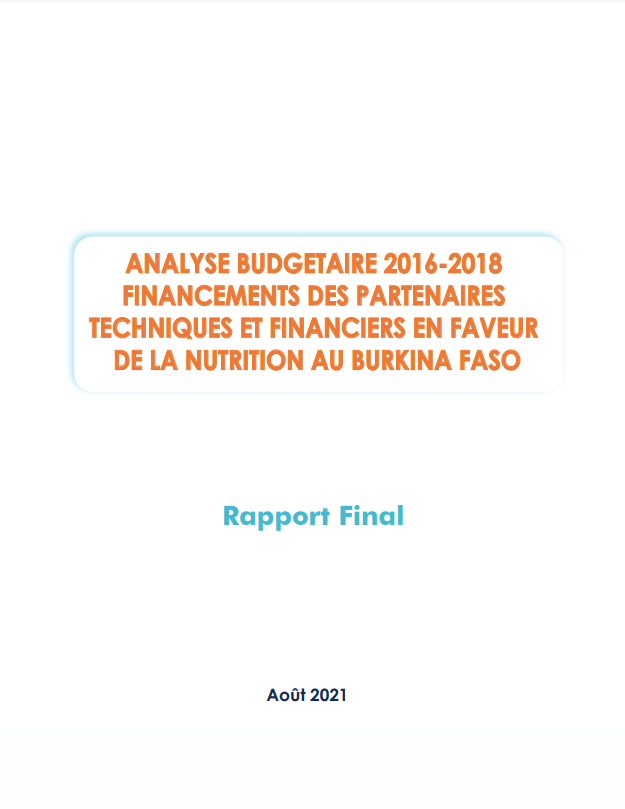
In Brief
The budget analysis of Technical and Financial Partners (TFP) funding for nutrition in Burkina Faso over the period 2016-2018 was initiated by the Civil Society Network for Nutrition (RESONUT), with the support of its partners. It responds to the desire of sector players to be able to estimate the amounts of TFP disbursements in favor of “sensitive” and “specific” nutrition interventions as defined by the 2013 Lancet review.
The study will provide reliable budget data for prioritizing, planning and informing allocation decisions and strategies in the nutrition sector.
This budget analysis of TFP funding for nutrition in Burkina Faso was carried out using the West African methodology for monitoring nutrition funding, which is modelled on the three-stage approach developed by the Scaling Up Nutrition (SUN) network:
– (i) identification of budget lines for pro-nutrition expenditure,
– (ii) categorization into nutrition-specific or nutrition-sensitive expenses and
– (iii) the weighting of identified expenditure categories according to their degree of connection with nutrition.
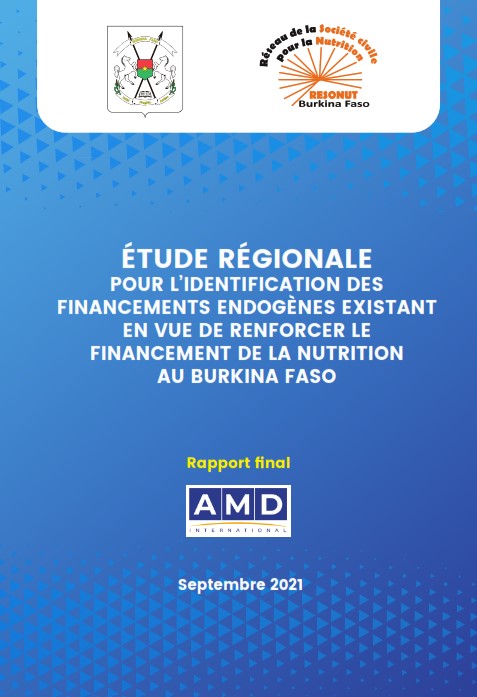
In Brief
The 2020 analysis of endogenous funding for nutrition in Burkina Faso’s two (02) communes with special status (Ouagadougou and Bobo-Dioulasso) was initiated by the Civil Society Nutrition Network (RESONUT), with the support of its partners. Its main aim is to take stock of this financing in order to identify its sources, growth sectors, strengths, weaknesses, opportunities, threats and so on.
The work was carried out using a participatory approach in line with the general framework of the West African methodology for monitoring nutrition funding. The analysis approach was to restructure the expected results into two (02) main components: (i) Diagnosis of endogenous financing for nutrition and health (ii) Budget analysis of endogenous financing.
The diagnosis covered four (04) pillars, namely (1) a review of the main sources of endogenous financing; (2) a review of the sectors that are conducive to endogenous financing; (3) a review of the SWOT in endogenous financing, and (4) a review of the institutional framework (system, players) for endogenous financing.
As for budget analysis, it starts from (a) identification of budget lines for pro-nutrition expenditure, (b) categorization into specific or nutrition-sensitive expenses and (c) the weighting of identified expenditure categories according to their degree of connection with nutrition.
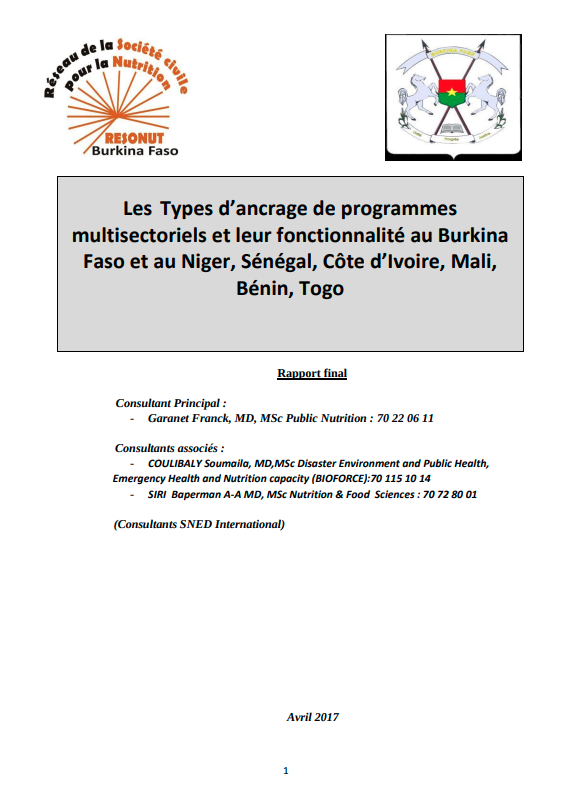
In Brief
The aim of this study is to evaluate the coordination mechanisms of multi-sectoral programs in Burkina Faso and in the sub-region, in order to propose a suitable institutional anchoring model for nutrition in Burkina Faso.
This was a study based on literature review and a field survey conducted from February 1 to 28, 2017. A purposive sample of institutional bodies with a multi-sectoral coordination mechanism were selected for the study. We conducted focus group interviews, an expert interview and in-depth individual interviews. These elements were also reinforced by documentary research and a literature review in the field of nutrition in Burkina Faso and the countries concerned. The main factors limiting the functionality of multisectoral coordination mechanisms were :
The degree of involvement of resource people in the sectors concerned. When first-line managers are aware of the situation and committed to it, they become more involved in the operation of coordination mechanisms, and provide the right impetus to follow.
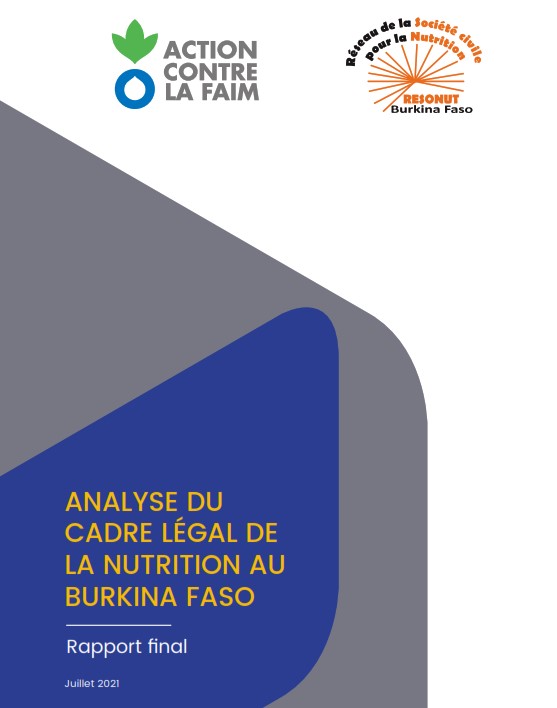
In Brief
Food and nutritional security has always been a key concern for governments in Burkina Faso. Enormous efforts have been made to protect people from the vulnerability caused by unstable food production at all levels. Production support programs have been developed and implemented for many years, and food security coordination mechanisms have been set up to ensure effective governance in this area. However, despite these efforts, food and nutrition insecurity remains a major concern in Burkina Faso, as evidenced by the recurrence of shocks (unavailability and inaccessibility of foodstuffs, unstable supplies, etc.) faced by many vulnerable populations.
Empirical evidence from the field shows that the majority of malnourished people in Burkina Faso are pregnant and breastfeeding women, and children under five living in rural areas. These inequalities were mainly due to difficulties in accessing health services and to archaic and inadequate dietary practices. With this in mind, the Burkinabe government has committed to the new global development agenda enshrined in the Sustainable Development Goals (SDGs), for which the recommendations made in this document aim to achieve its second goal (SDG2), which advocates “the elimination of hunger, the achievement of food security and the promotion of sustainable agriculture”, by 2030.
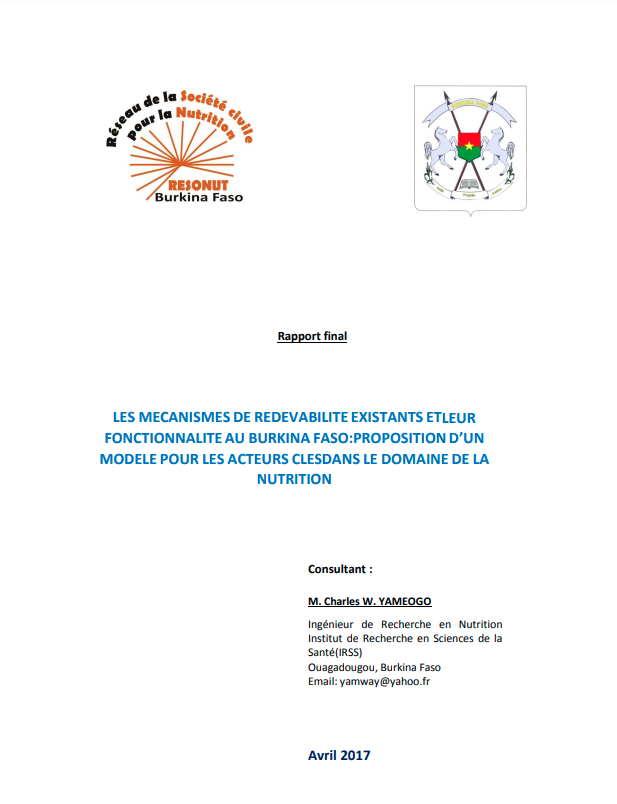
In Brief
Today, malnutrition is a public health problem that contributes negatively to development in general. The fight against this scourge has been underway for years, but it still remains. To tackle this problem, we need to make those responsible for the well-being of the population, the players and donors in the field of nutrition, face up to their responsibilities. Thus, accountability, which is a means of reporting on commitments between government, stakeholders, donors, civil society and beneficiaries, is important to the success of nutrition programs. To this end, a study of existing accountability mechanisms and their functionality in Burkina Faso is important and will contribute to the success of the fight against malnutrition.
The aim of this study is to provide a critical analysis of accountability mechanisms for multi-sector or cross-cutting programs (nutrition, gender, HIV/AIDS) in Burkina Faso. This analysis will help promote and/or strengthen the accountability of nutrition stakeholders in nutrition management.
To carry out this study, 7 public/private structures working in the field of nutrition, gender and HIV/AIDS in Burkina Faso were selected and interviewed. In addition, available documentation on accountability mechanisms was exploited as part of the study.
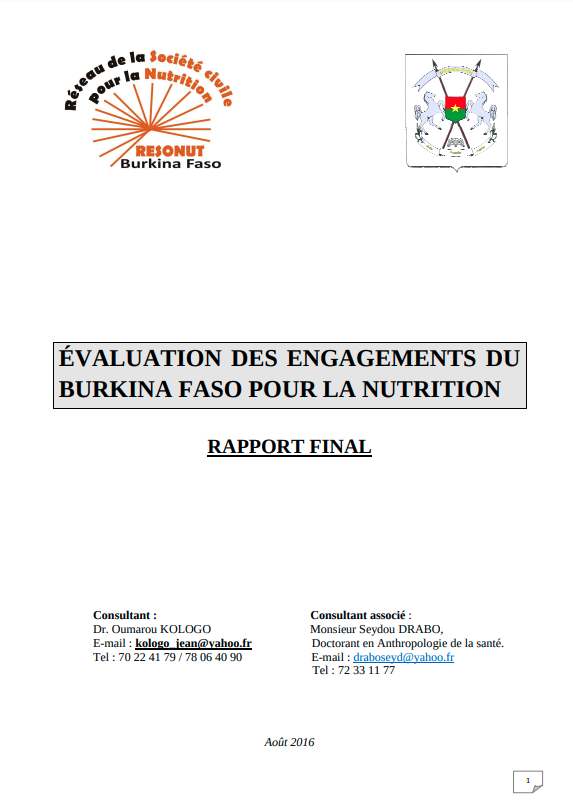
In Brief
The present study is an opportunity to understand and analyze the efforts made by the State in the field of nutrition. It therefore takes stock of Burkina Faso’s political, legal and economic commitments, and attempts to assess their level of implementation.
As a cross-cutting issue with little capitalized data, we could expect difficulties in gathering relevant data and carrying out a proper analysis. In addition to this difficulty, the availability of resource people during the vacation period in most international and non-governmental organizations made the task even harder. Despite these difficulties, the data collected shows that Burkina Faso’s commitments are based on those made at international and regional level through various conferences and United Nations resolutions.
As far as financial commitments are concerned, the Abuja and FANUS declarations, which call on countries to allocate 15% of national budgets to health and 3% of their sectoral budgets to nutrition respectively, are the main guidelines. As Burkina Faso took part in the conferences which adopted the said declarations, they are applicable to it.
Also worthy of note are the important commitments made in the African Regional Nutrition Strategy (ARNS), the Global Compact on Nutrition for Growth (N4G) and the conclusions of the International Conference for Nutrition (ICN2).
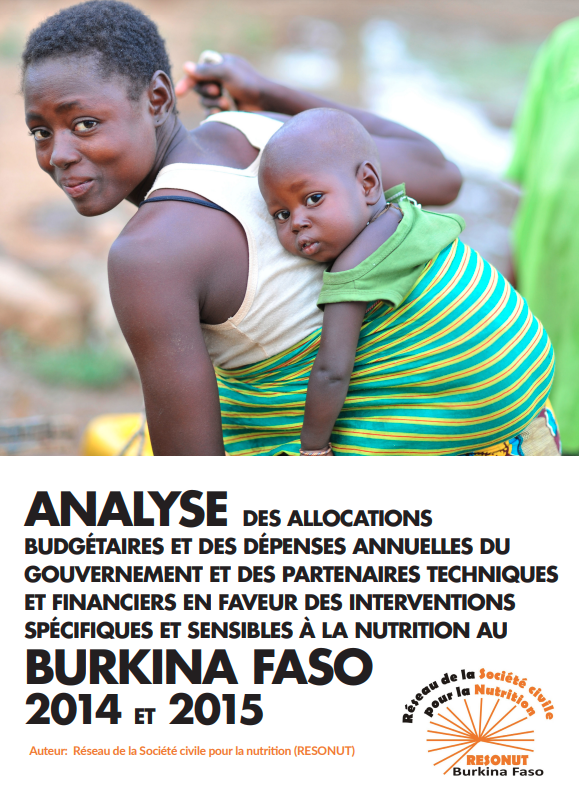
In Brief
Reducing malnutrition is recognized as a global priority, and is enshrined in the United Nations Millennium Declaration. as one of the key Sustainable Development Goals (SDGs). However, despite Despite sustained global commitment, progress towards achieving the SDGs, including the reduction of malnutrition, still fall short of expectations. In Burkina Faso, as in most Sahelian countries, malnutrition is still a major problem.
a major health and development issue. Faced with this situation, the government has been committed for almost a decade to strengthening its interventions in the
and in particular the nutrition sector.
Despite these commitments and the actions already undertaken, the problem of malnutrition still remains. In 2015, the prevalence of acute and chronic malnutrition stood at 11.0% and 30.2% respectively, with significant geographical disparities exceeding World Health Organization alert thresholds (MS, 2016). Malnutrition has contributed to around 28,800 child deaths in Burkina Faso in 2015 (UNICEF, 2015).
To reverse this trend, we need to do more to promote nutrition.

In Brief
“L’analyse des allocations budgétaires des partenaires techniques et financiers (PTF) en faveur des interventions spécifiques et sensibles à la nutrition au Burkina Faso en 2014 et 2015” was a study commissioned by the Réseau de la Société civile pour la Nutrition (RESONUT), chaired by the humanitarian NGO Action Contre la Faim (ACF), Mission Burkina Faso.
This study is intended to provide input for advocacy, through dialogue with TFPs, on ways of increasing resources for nutrition.
With this in mind, the general aim of this report is to analyze TFP allocations/disbursements to interventions that are sensitive and specific to the
nutrition in Burkina Faso, as defined by the 2013 Lancet review. Initial work on this study began in June 2016. A scoping workshop
and amendment of the methodology was held at the end of July 2016 with the study monitoring committee.
Subsequently, data collection tools, validated by the study’s technical monitoring committee, were used to collect data from the Direction Générale de la Coopération (DGCOOP) and TFPs.
The methodology for estimating TFP disbursements proposed by the mission was inspired by the SUN’s revised three-stage methodology: (i) identification, (ii) classification and (iii) weighting (Fracassi and Picanyol, 2016). The identification and classification of projects and programs was facilitated by the existence in Burkina Faso of a Common Nutrition Results Framework (CCRN). This framework made it possible to list a total of 21 sensitive interventions and 5 nutrition-specific interventions.
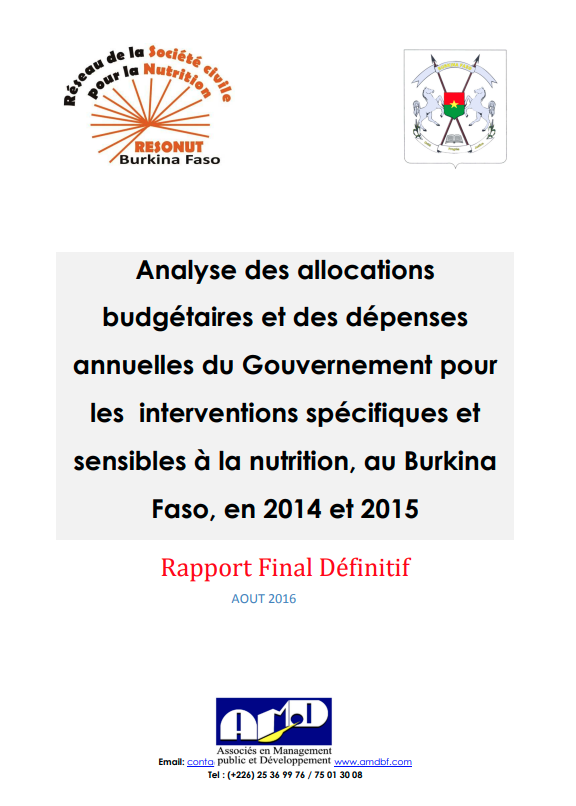
In Brief
The study on “Analysis of budget allocations and government spending on specific nutrition-sensitive interventions” was commissioned by the Réseau de la Société civile pour la Nutrition (RESONUT), chaired by the NGO
Action Contre la Faim (ACF), Mission Burkina Faso.
This study is intended to feed into the “Burkina Faso’s Commitments to Nutrition Rio 2016” advocacy campaign, through a dialogue with public authorities on ways to increase the effectiveness, equity and efficiency of public spending.
in nutrition.
Pursuing this ambition, the overall objective assigned to the study was to determine the amount of funds allocated and spent on specific, nutrition-sensitive interventions, as defined by the 2013 Lancet review.
